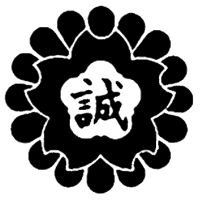|
Kyushu Seido-kai
The Kyushu Seido-kai (九州誠道会, Kyūshū Seidō-kai) was a yakuza organization based in Fukuoka Prefecture on the Kyushu island of Japan, with an estimated 150 active members.[1] Headquartered in the southern Fukuoka region of Omuta, the Kyushu Seido-kai maintains its offices in five other prefectures including Tokyo.[2] Since its formation, the Kyushu Seido-kai has been known for its blatant armed conflicts with its former parent syndicate, the Dojin-kai,[3] involving various hazardous weapons such as automatic firearms (especially the AK-47), petrol bombs and hand grenades. While violently feuding with the Dojin-kai, the Kyushu Seido-kai has caused deaths among several innocent civilians as well as numerous yakuza members,[4] and because of that, despite being a relatively recently established group, the Kyushu Seido-kai has been a designated yakuza group since 2008.[5] HistoryThe Kyushu Seido-kai launched in 2006 as the Dojin-kai's splinter group[6] led by the Omuta-based Murakami-ikka clan,[5] after the long-time Dojin-kai boss Seijiro Matsuo announced his resignation, sparking a war of succession.[7] In 2007 a Dojin-kai member attempted to murder a Seido-kai member, but ended up killing an innocent bystander.[8] The Kyushu Seido-kai ended up receiving official registration as a designated yakuza group under the Organized Crime Countermeasures Law on February 28, 2008.[9] In 2011, the Seido-kai's feud with the Dojin-kai escalated,[10] and many Seido members were killed by the Dojin-kai; two Seido seniors were killed by alleged Dojin-kai's grenades in Omuta (April),[11] one Seido member was stabbed to death in Ogi, Saga (April),[12] and one Seido senior was shot to death in Imari, Saga (April).[13] ConditionThe Kyushu Seido-kai is one of the five independent Fukuoka-based designated yakuza syndicates, along with the Kudo-kai, the Taishu-kai, the Fukuhaku-kai, and the Dojin-kai.[14] The Kyushu Seido-kai maintains its offices in six prefectures;[2] Fukuoka, Saga, Nagasaki, Kumamoto, Yamagata,[15] and Tokyo.[2] In 2008, the Kudo-kai's third-generation president Hideo Mizoshita died and his funeral was attended by many yakuza magnates representing their respective syndicates from all over the country. The Seido-kai was the only designated yakuza syndicate absent from this event.[16] The second president Namikawa has allegedly maintained a close relationship with Kunio Inoue. Inoue is the president of the fourth-generation Yamaken-gumi, an affiliate of the largest-known Yamaguchi-gumi syndicate.[17] ActivitiesThe Kyushu Seido-kai's illegal activities have allegedly included loansharking and methamphetamine trafficking.[18] The Seido-kai was allegedly the largest drug trading division of the Dojin-kai, as rumored by some local Omuta in-the-know men, hence the informal dub name of the "Seido Pharmacy". Even the 55-year-old founding president Murakami was arrested for methamphetamine possession.[19] On June 11, 2013, Kyushu Seido-kai announced the end of its gang war with Dojin-kai as well as its dissolution.[20] References
|
||||||||||||
